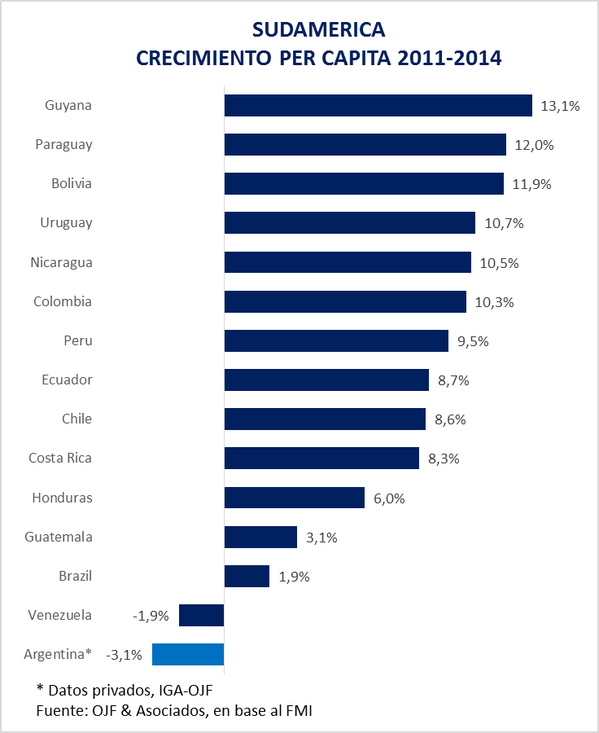Vamos a tener que empezar a hablar de esto:
El Fondo Monetario Internacional ratificó ayer su apoyo a las medidas económicas que el Gobierno lleva a cabo para poner en caja los desequilibrios de la macroeconomía.
https://www.clarin.com/ieco/fmi-reformas-pueden-complicadas-demorar-rendir-frutos_0_HJKlGSHal.html
Que nos lleva a esto:
MF Says Its Policies Crippled Argentina
Internal Audit Finds Warnings Were Ignored
By Paul Blustein
Washington Post Staff Writer
Friday, July 30, 2004; Page E01
The International Monetary Fund’s handling of the crisis in Argentina three years ago almost certainly deepened a recession that threw millions of Argentines into poverty and sparked political chaos throughout the country, according to a report released yesterday by the IMF’s internal audit unit.
By overlooking Argentina’s growing indebtedness in the 1990s and continuing to lend the country money when its debt burden had become unsustainable, the fund significantly contributed to one of the most devastating financial crises in history, the report concluded.
The crisis peaked when the Argentine government defaulted on nearly $100 billion in debt to private creditors and had to abandon the “convertibility” system that pegged the peso to the dollar at a one-to-one rate. The ensuing crash led to an 11 percent decline in Argentine output in 2002, sent the jobless rate soaring and toppled a series of presidents in a country that the IMF had once hailed as a model of free-market reform and development.
“It would have been an ugly crisis anyway, but perhaps not quite as bad if the fund had supported a change in strategy earlier,” said Isabelle Mateos y Lago, an economist from the IMF’s Independent Evaluation Office, which produced the report.
The report provides potent ammunition to critics who contend that IMF rescues often fail to save developing countries from investor panic and even make matters worse. It also reinforces the complaint that the IMF’s loan packages frequently bail out private lenders without requiring them to accept reductions in their claims, causing countries’ debt burdens to build and their problems to fester.
At the same time, the study helps rebut criticism that the fund insists on excessive austerity in developing countries. In Argentina’s case, the report concluded that officials were too lenient.
Although it remains to be seen whether IMF policies will change as a result, fund officials have long said that the Argentine debacle taught them harsh lessons. The report echoes criticisms made by IMF staffers, including Michael Mussa, the fund’s chief economist from 1991 to 2001.
The report’s critique is exceptionally damning, showing how fund officials overlooked vulnerabilities, ignored warnings from some staffers and shrank from confronting the economic forces that brought Argentina to its knees. It goes considerably further than earlier assessments by citing internal IMF memoranda, minutes of meetings and other previously undisclosed facts about key developments in the crisis.
For example, the report questions why the IMF agreed in the late 1990s to a three-year program that would provide loans on a contingent basis if Buenos Aires needed the money. A memo by the fund’s research department in November 1997 complained that the program, and in particular the list of reforms required of Argentina, was “not ambitious enough to warrant Fund support,” according to the report. Those concerns, however, were downplayed by others at the IMF, especially top management, the internal report concluded.
Although Argentina’s yearly budget deficits were not overly large, the government’s indebtedness was rising at an alarming rate because of off-budget spending. Yet the size of the debt “became the main focus of [IMF] briefing papers and policy discussions only in late 1999 or early 2000,” when it was approaching 50 percent of gross domestic product, the report says. “By then, the economy was in recession, and efforts to reduce the debt . . . were difficult and possibly also counterproductive,” the IMF study found.
http://www.washingtonpost.com/wp-dyn/articles/A25824-2004Jul29.html
IMF admits mistakes in Argentina crisis
By Edmund Conway
12:01AM BST 30 Jul 2004
The International Monetary Fund yesterday admitted that its mistakes helped plunge Argentina deeper into the red during the currency crisis that crippled the country’s economy three years ago.
In a report published yesterday by its independent evaluation office, the IMF said it ought to have prevented the Argentine government from following poor economic policies.
“IMF surveillance failed to highlight the growing vulnerabilities in the authorities’ choice of policies and the IMF erred by supporting inadequate policies too long,” it said.
The financial meltdown that reached a climax in 2001, causing the country to default on $132 billion of foreign debt, was worsened by the government’s vain attempts to maintain the Argentine peso’s peg against the dollar. The IMF ploughed money into the country to help it sustain the peg, pledging an extra $22 billion as late as the end of 2000.
“In retrospect, the resources used in an attempt to preserve the peg could have been better used to mitigate some of the inevitable costs of exit,” the report said.
http://www.telegraph.co.uk/finance/2891368/IMF-admits-mistakes-in-Argentina-crisis.html


